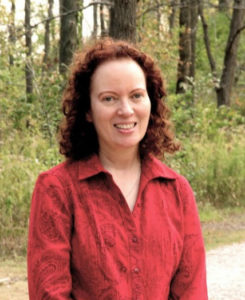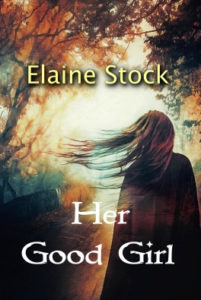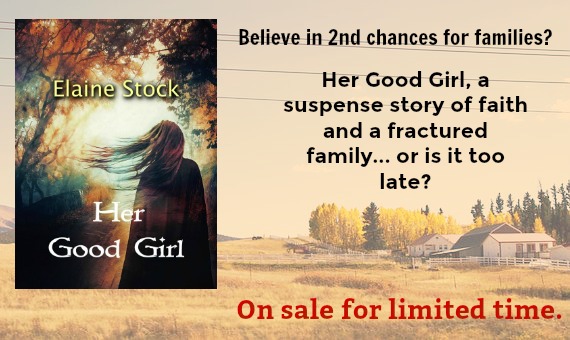 As a young girl Elaine Stock fancied herself as a famous playwright. She eventually reset her goals to mainstream contemporary fiction, and then took a hard detour into inspirational fiction.
As a young girl Elaine Stock fancied herself as a famous playwright. She eventually reset her goals to mainstream contemporary fiction, and then took a hard detour into inspirational fiction.
Now a multi-published, award-winning author, Elaine has semi-finaled in the American Christian Fiction Writers Genesis contest, received My Book Therapy’s Frasier Bronze Medalist award, and won the People’s Choice Award in the Family Fiction contest for her short story, In His Own Time.
Elaine and her husband live in upstate, rural New York.
Let’s talk about your new book, Her Good Girl (GTG Publishing, January 2018). Please tell us about it.
Kathy, heartfelt thanks for having me back on your blog. You’re a joy to know and I’ve admired Divine Detour for years.
Her Good Girl is a suspenseful coming-of-age story of a whole family. Sadie is about to turn eighteen and although she has years ahead to look forward to, she doesn’t because she’s trapped. Both physically and emotionally, by a mother who has fallen into the destructive mire of Munchausen By Proxy disorder (MBP), an illness when usually a mother (although it can be anyone) inflicts her child with drugs or deprives the child of food and other life essentials to purposely make the child ill and then to gain attention by drawing the attraction of the medical staff to herself. Yet, it’s also the story of other family members withdrawing into their own protective skins and falling into everyday patterns that blind them to the very people they love.
The bulk of the story takes place in five days. At first, Sadie sees her way out of this messy life when she falls for a schoolmate who offers her hope and promises of a beautiful future, free of pain and anguish. But then, he pushes onto her that the only way out is to kill her mom and then runaway with him.
Can she go in on this crazy plot with him?
What is crazy? What is sane?
Sounds dark? No, not really… because the story is infused with God’s brightness and love. And on that note, you know there’s hope.
I’m blessed to say Her Good Girl is receiving several phenomenal reviews.
 What led you to write this particular story? Were there any special challenges?
What led you to write this particular story? Were there any special challenges?
I first became aware of Munchausen By Proxy (MBP) several years ago when I read an article about what I thought was an emotional disturbance. Research shows that this is maltreatment (abuse and/or neglect) when a person—usually a parent—seeks emotional fulfillment by inflicting an illness on another, often one’s child, and often resulting in death. Recent cases such as the 1996 arrest of Kathy Bush for making her then nine-year-old daughter, Jennifer sick; the 2014 death of five-year-old Garnett by his mother Lacy Spears; and the recent Baby Jax case of a woman, Jessica Valik, who tampered with her son’s feeding tube, are one too many. Yet, I have not written about this type of tragedy and sadness to become a sensationalist.
Stories about the complexities of families draw my attention. I strive to tell stories that inspire others that, through the love and grace of God, one can move forward, families can heal, that there is hope, and that there is no reason to go back. Goodness can, and does, happen to troubled families.
As for writing challenges, I love to challenge myself each time I write a novel. I think I need that self-dare to keep my adrenaline in full throttle. So, in this particular story, as I’ve shared, I set a time frame limit of the story to take place over a handful of days. That was fun! Really! Also, Sadie’s dad is a spelunker—he thrives in underground caving expeditions. As a child my family and I visited a few tourist-type caves, but for this novel I read about real-life cave exploration accounts and how-to books and watched hours and hours of caving videos, which is riveting! Caving is NOT for the faint hearted, the person with body parts that like to go on strike (like the discs in my neck and weak right wrist), or the claustrophobic. I did have a spelunker review my novel for errors and he gave a nod of approval.
A painter might use color, light, and/or shadows in s certain way to sign his work. A musician may use syncopation, key changes, and/or vocal intonation to set herself apart. What two or three elements most define who you are as a storyteller?
Fascinating question. First, from the feedback I received in reviews, it seems as if I write outside of the standard box when it comes to POV (point of view) for characters. I’m surprised by this reaction, although I take it as a compliment. I’ve read many novels that play around with first person point of view and third person point of view. In Her Good Girl, I chose first person point of view for Sadie while the other characters were third person point of view. I did this because Sadie, a teenager, still sees the world through her teen me-me-and-more-me perspective, though this changes as the story evolves and she learns to think outside of herself. Also, particularly for her, the character of Sadie didn’t seem to come to life until I tried first person POV. One reviewer commented that this POV helped to create a psychological thriller type of story. Love that!
I also try to give the readers visuals that she or he may not typically find in other novels. For instance, in Her Good Girl, Sadie sees heart-shaped candies floating around her boyfriend’s head… well… at least, in her mind’s eye she does.
A few fun questions…
What Biblical character do you most relate to — and why?
Without a doubt, Joseph. I love how he dealt with family betrayal, was left to die but then sold into slavery, and still rose above his circumstances. Then, when the very family that washed their hands of him came to him for his help, Joseph was able to forgive them. Plus, like Joe, I’ve had some wild dreams that have come true. I’d love to sit down with him and chat! Maybe, one day…
The beginning of a new year is a time when we set new goals. If you knew you couldn’t fail, what new goal or dream would you pursue this year?
To go full steam into this time-slip story that is brewing in my mind. I just may…
Given the task of mentoring a young author, what’s the one most important thing you would share with them?
Great question, Kathy. I would like to work with them on building their confidence in their storytelling abilities and helping them cope with critiques or anyone who claims a certain story can’t work. We all need to respect our inner writer; we all have stories that must be told.
That’s sage advice! Thanks for taking the time to guest again at Divine Detour. Blessings, my friend.
[ctt title=”We all need to respect our inner writer; we all have stories that must be told. ~ Elaine Stock” tweet=”We all need to respect our inner writer; we all have stories that must be told. ~ @ElaineStock https://kathyharrisbooks.com/elaine-stock-her-good-girl/” coverup=”nF6dh”]
~ ~ ~
For more information about Elaine, visit her website, her popular blog, Everyone’s Story, or on Facebook and Twitter.
To order Her Good Girl, available in both print and Kindle, log on to:

Kathy, as always, thanks much for the great blog feature. I appreciate it; I appreciate you!
Always love having you visit, Elaine! Thanks for taking the time.
Wonderful interview. I have read and loved Her Good Girl.
Ann, thanks for your visit. Your support and friendship through the years mean so much to me!
Thanks for stopping by, Ann!